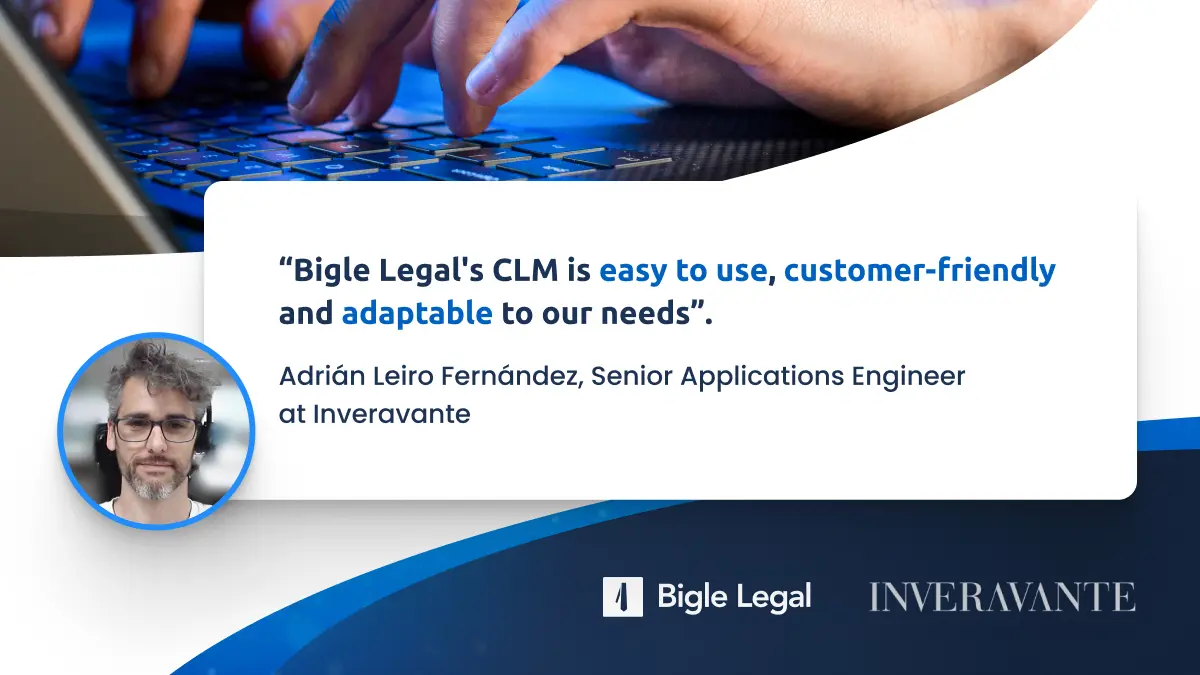Efficient Contract Management in Enterprises: Risk down, Compliance up
Efficiently managing the "contract life cycle" can be a headache for many corporations. That is it is important to have a contract lifecycle management strategy in place.
It is often said that medium and large corporations go at a very slow pace and that in order to execute an action it must be previously validated by many professionals and, consequently, decision-making takes unnecessarily long time.
If you want to know more about the "contract life cycle", Check out this post.
This article is also available in Spanish

Why is contract management in corporations so complex?
This issue is present, with greater or lesser incidence, in all corporations but it happens that it is often not paid enough attention. Only when risks materialize, they are really taken into account.
Many companies have scattered the contracts they have signed with clients and / or suppliers, being stored in paper format in outdated filing cabinets or even on the table of the person who signed it.
This very traditional way of storing them, without supervision or control, generates a multitude of risks. Or what is the same: lost deadlines, financial penalties, lost business opportunities, and so on.
Let's go back to the beginning of this article: efficiently managing the "contract life cycle" is paramount in any company.
Through technology, all members of any department can, when required, form the "contract life cycle" in an optimal way, minimizing all risks. Less blockers and more executors. And that is why you should start using contract management software in your corporation.
Does your corporation really need an enterprise contract management software?
The answer is absolutely yes.
Why?
Simply because it allows optimizing resources and centralizing the management of all business contracts.
Through this software, any member, who is authorized (be careful! Using this technology, only authorized users will be able to access), which reduces the risk of information leakage.
This means that all decision makers, stakeholders and administrators can track, review, edit and manage documents throughout the 'contract life cycle'.
Centralization is a key element to efficiently manage contracts. If it is carried out in a decentralized way, that is to say, fragmented, it is when there are risks such as decision making out of time and poor communication between the parties involved and consequently workflows are delayed in time.
Surely at this point you will wonder if using contract management software is suitable for all corporations. The answer is yes. However, if your corporation is one of the following types, you should consider introducing it with high priority:
(a) Medium or large size corporations
Although size does not matter it is true that it can influence the volume of contracts to be managed.
As contracts accumulate, efficiently managing all the contractual history and those that have yet to be negotiated and signed is essential to mitigate the risks associated with them. Thus, a manual system cannot be the one commonly used.
Why? It is a waste of time and human resources to create and review contracts.
Not forgetting human errors (clerical errors) to which professionals who draft contracts are exposed. Automate allows you to process contracts quickly and efficiently and even locate a specific contract or find information.
(b) Corporations with various departments or offices
With enterprise contract management software, organizations can connect all their departments and offices on a single platform. In addition, it will facilitate collaboration between the parties involved in the negotiation while a contract is being drafted, which keeps everyone on the same line and thus avoiding risks such as undue delays, misunderstandings or lack of communication.
(c) Corporations with strict compliance standards
The so-called compliance, or what is the same: acting in accordance with the regulations, is a vital issue in some sectors such as health, legal or the food industry.
Errors or oversights that may seem unimportant a priori can lead to the advent of risks that can seriously jeopardize your business future.
Establish security measures within the system so that no contract violates internal controls can be a point to take into account at the time of the (automated) creation of contracts. Also, in these corporations it is essential that the software employs security measures to protect confidential documents from unauthorized users.
(d) Corporations working with complex business contracts
Can you imagine carrying out a complex negotiation and losing all progress because all the information has not been stored correctly?
Managing them manually can lead to risks of loss of information, not being able to review previous agreements or not controlling who makes contributions to the contract.
In corporations that work with complex business contracts, it is possible, through technology, to mark milestones in which the content of the document can be controlled and reviewed if necessary through an alert system, for example.
What must be taken into account when choosing an enterprise contract management software?
One of the aspects that are decisive to start using software such as Bigle Legal is the ease of use. Not all users who are going to use the technology are going to be digital natives, so it is very convenient that it be intuitive: learning by doing.
An attractive dashboard through which we can quickly access what we are looking for or can quickly create / edit a contract or generate a report can lead to an attractive tool to be used on a day-to-day basis as a contract manager for the corporation. In contrast, an intuitive interface or complicated processes will discourage employees from learning how to use it.
Good contract software management must have the ability to minimize the amount of risks associated with contracts through intuitive models and smart alerts.
Moving in a collaborative environment allows the parties involved to work in the same place, reducing the risks that communication is not fluid and that the contract in which they work is different from that of the others.
Furthermore, being able to review what other users have modified or added allows for exhaustive version control to minimize risks. Empower your team with document automation.
As we have just seen, each corporation is different.
Therefore, the configurability factor allows adapting the software to the reality of each corporation and each user.
If a platform can be integrated with other software, effectively tracking contracts, managing a variety of risks, and providing contract information, it will respond efficiently to enterprise contract management.
Let's not forget the size of the corporation. Undoubtedly, how large the corporation is will significantly influence whether it is optimal to implement software to automate legal documents.
Although a priori in a small corporation or a startup it may seem that it is not necessary to implement it, we recommend doing it.
Doing things right from the beginning is the best strategy.
Automating processes, effectively monitoring approved contracts and getting used to working with technology allows that when the corporation grows and internal management becomes more complex, it has been internalized to use it and, consequently, cost savings and risk minimization.
Last but not least: security. It is necessary to opt for a technology that stores contracts in a secure and encrypted way and that also allows the delivery of contracts in a secure way (worth the redundancy) so that the parties sign them digitally. It's about protecting all sensitive data and other critical information.
Storing confidential information on unsecured sites is not a good deal, they expose your corporation, and risks of data breaches are likely to materialize that can be very detrimental to the financial health or viability of a corporation.
What are the steps to establish an effective enterprise contract management strategy?
The first thing you have to do is take action. It is not enough to think about the benefits of software to correctly manage contracts, it must be executed.
At this first moment what you should do is analyze how it is going to be organized or how the mechanics of the hiring process works.
Understanding how the contract negotiation processes work in your corporation and planning how it will be implemented in contract management software can save a lot of time.
Also at this time it is essential to familiarize yourself, as well as the rest of the corporation team, with the contract templates to accelerate the process of creating and editing documents: do they follow a structure according to the corporation's methodology, such as the term, notification, payment method, etc.
Are notifications about deadlines and expiration date automated?
Can you use an electronic signature?
To implement an effective management strategy for enterprise contract management it is necessary to develop a uniform process and use documents with the same structure (we can achieve this through the use of automated templates in Bigle Legal).
Next, you should pay attention to the registration of the contract. That is, it is auditable. At this point, the evolution or "life cycle of the contract" and all the people who have participated in drafting it will be analyzed.
Finally, get information. With this, we can identify the risks that arise and the business opportunities that can be generated. Artificial Intelligence is a great ally to boost new businesses.
 By
By



